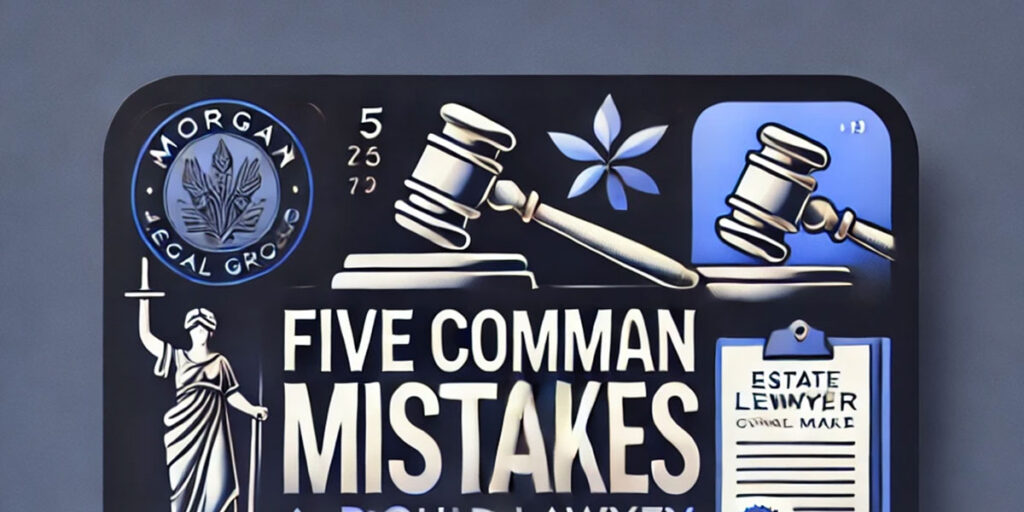Five Common Mistakes a Probate Lawyer Could Make in New York
Probate is a vital process for administering an estate after someone’s death. However, even experienced professionals can encounter challenges during probate proceedings. Understanding common mistakes made by probate lawyers in New York can help you ensure your estate is handled efficiently and in compliance with state laws. At Morgan Legal Group, we aim to highlight these issues to help families avoid unnecessary delays, disputes, and financial losses.
1. Misinterpreting the Will
Overlooking Ambiguities
One of the most common errors in probate involves misinterpreting the terms of a will. In New York, the Surrogate’s Court requires precise adherence to the will’s instructions. Ambiguities in wording can lead to disputes among beneficiaries and prolonged legal battles.
For example, a will might state that “the house should be divided equally among children.” Does this mean the house itself must be sold and proceeds distributed, or should the property be co-owned? Misunderstanding such nuances can delay the probate process and increase legal costs.
How to Avoid This Mistake
A skilled probate lawyer should analyze the language of the will thoroughly and, if necessary, seek clarification from the court or involve all beneficiaries in discussions. Clear communication and documentation are key to resolving ambiguities.
2. Failing to Identify All Estate Assets
Incomplete Asset Inventory
Another significant mistake is failing to identify and locate all the deceased’s assets. New York probate law mandates a comprehensive inventory of the estate, including bank accounts, real estate, investment portfolios, and personal property.
Overlooking hidden or unknown assets can lead to incomplete distributions, dissatisfied beneficiaries, and potential legal challenges. For instance, unclaimed bank accounts or forgotten retirement plans might only come to light years after the probate process concludes.
How to Avoid This Mistake
An effective probate lawyer will perform a detailed search for all assets, including reviewing financial records, consulting with family members, and using professional asset search services. Keeping organized records and using tools like digital asset tracking can also help.
3. Mishandling Debts and Taxes
Underestimating Tax Obligations
New York imposes specific requirements regarding estate taxes and debt settlement. Failing to account for these obligations can result in penalties or delays in asset distribution.
For example, if an estate’s tax filing is incomplete or incorrect, the executor could face fines from the New York State Department of Taxation and Finance. Similarly, neglecting to settle debts with creditors before asset distribution could lead to legal claims against the estate.
How to Avoid This Mistake
Probate lawyers must ensure all debts and taxes are paid before distributing the estate. Consulting with tax professionals and maintaining detailed records can help prevent costly errors. Proper communication with creditors and timely filings are also essential.
4. Ignoring Dispute Resolution
Failing to Address Beneficiary Disputes
Family conflicts often arise during probate, especially when multiple beneficiaries are involved. Common disputes include disagreements over the interpretation of the will, accusations of undue influence, or dissatisfaction with asset distribution.
Ignoring these disputes can escalate tensions, resulting in lengthy and expensive court proceedings. The executor may also face accusations of favoritism or breach of fiduciary duty.
How to Avoid This Mistake
An experienced probate lawyer should act as a mediator, addressing concerns promptly and transparently. Open communication with beneficiaries and seeking court guidance when necessary can help resolve conflicts effectively.
5. Mismanaging Probate Deadlines
Missing Filing Deadlines
The probate process in New York is governed by strict deadlines, from filing the will with the Surrogate’s Court to submitting final tax returns. Missing these deadlines can delay the process, incur fines, or even result in the dismissal of the probate petition.
For instance, the executor must notify creditors within a specific timeframe and provide beneficiaries with regular updates. Failure to meet these obligations may result in legal consequences.
How to Avoid This Mistake
Probate lawyers should use tools like task management software to avoid missing deadlines and maintain a detailed timeline of all required filings and actions. Regularly communicating with the executor and court staff ensures that all steps are completed on time.
Why Choose Morgan Legal Group?
At Morgan Legal Group, we understand the complexities of probate in New York. Our team is dedicated to providing personalized guidance to executors, administrators, and beneficiaries, ensuring the process is as smooth and stress-free as possible.
Our Expertise
With years of experience handling probate cases across New York City, we have the skills to address challenges efficiently and effectively. From asset identification to dispute resolution, our comprehensive approach ensures compliance with all state laws and court requirements.
Our Commitment
We prioritize your peace of mind. Whether you need assistance with a complex estate or guidance through a straightforward probate process, our team is here to support you at every step.
Conclusion
Probate is a challenging legal process that requires precision, expertise, and attention to detail. You can ensure a smoother estate administration by understanding common mistakes—such as misinterpreting the will, failing to identify assets, mishandling debts and taxes, ignoring disputes, and missing deadlines. Hiring a knowledgeable probate lawyer, like those at Morgan Legal Group, is the best way to avoid these pitfalls and protect your loved one’s legacy.
Contact Morgan Legal Group today to learn how we can assist you with your probate needs in New York.









